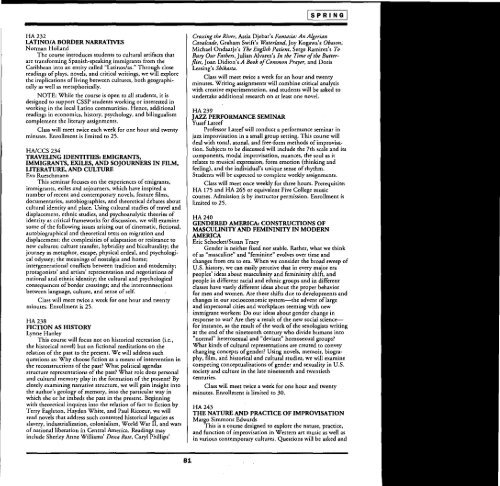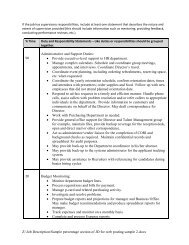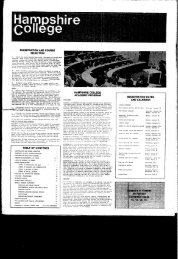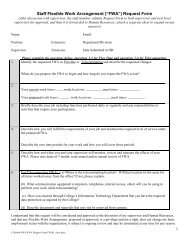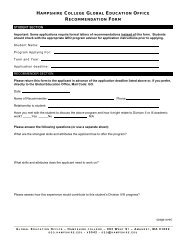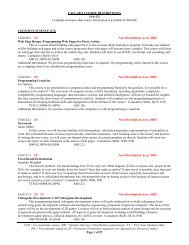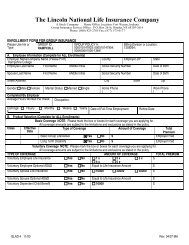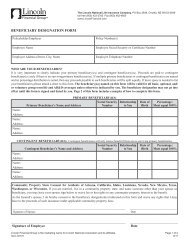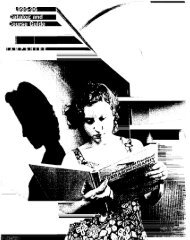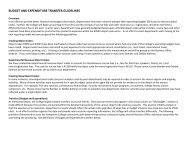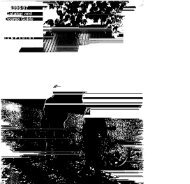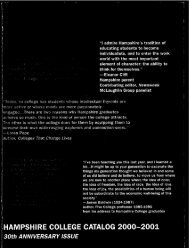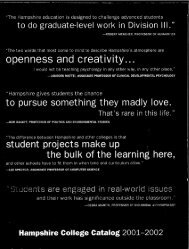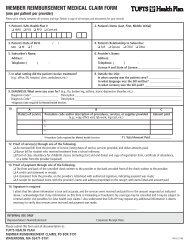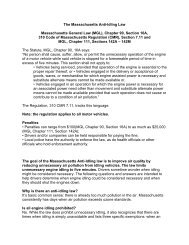school of social science - Hampshire College
school of social science - Hampshire College
school of social science - Hampshire College
Create successful ePaper yourself
Turn your PDF publications into a flip-book with our unique Google optimized e-Paper software.
HA232<br />
lATINO/A BORDER NARRATIVES<br />
Norman Holland<br />
The course introduces students to cultural artifacts that<br />
are transforming Spanish·speaking immigrants from the<br />
Caribbean into an entity called "Latinos/as." Through close<br />
readings <strong>of</strong> plays. novels. and critical writings, we will explore<br />
the implications <strong>of</strong> living between cultures. both geographically<br />
as well as metaphorically.<br />
NOTE: While the course is open to all students, it is<br />
designed [0 support CSSP students working or interested in<br />
working in the local Latino communities. Hence. additional<br />
readings in economics, history, psychology, and bilingualism<br />
complemem the literary assignments.<br />
Class will meet twice each week for ooc hour and twenty<br />
minutes. Enrollment is limited to 25.<br />
HA/CCS 234<br />
TRAVEUNG IDENTITIES. EMIGRANTS,<br />
IMMIGRANTS, EXILES, AND SOJOURNERS IN FILM,<br />
LITERATURE, AND CULTURE<br />
Eva Rueschmann<br />
This seminar focuses on the experiences <strong>of</strong> emigrants.<br />
immigrants, exiles and sojourners, which have inspired a<br />
number <strong>of</strong> recent and contemporary novels, feature films.<br />
documentaries, autobiographies. and theoretical debates ahout<br />
cultural idemicy and place. Using cultural studies <strong>of</strong> travel and<br />
displacement, ethnic studies, and psychoanalytic theories <strong>of</strong><br />
identity as critical frameworks for discussion, we will examine<br />
some <strong>of</strong> the following issues arising out <strong>of</strong> cinematic, fictional,<br />
autobiographical and theoretical texts on migration and<br />
displacement: the complexities <strong>of</strong> adaptation or resistance to<br />
new cultures; culture transfer. hybridity and biculturality; the<br />
journey as metaphor, escape. physical ordeal. and psychological<br />
odyssey; the meanings <strong>of</strong> nostalgia and home;<br />
intergenerational conflicts between tradition and modernity;<br />
protagonists' and artists' representation and negotiations <strong>of</strong><br />
national and ethnic identity; the cultural and psychological<br />
consequences <strong>of</strong> border crossings; and the interconnections<br />
between language. culture, and sense <strong>of</strong> self.<br />
Class will meet twice a week for one hour and twenty<br />
minutes. Enrollment is 25.<br />
HA238<br />
FICTION AS HISTORY<br />
Lynne Hanley<br />
This course will focus not on historical recreation (i.e.,<br />
the historical novel) but on fictional meditations on the<br />
relation <strong>of</strong> the past to the present. We will address such<br />
quesdons as: Why choose fiction as a means <strong>of</strong> intervention in<br />
the reconS(fuctions <strong>of</strong> the past? What political agendas<br />
structure representations <strong>of</strong> the past? What role does personal<br />
and cultural memory play in the formation <strong>of</strong> the present? By<br />
closely examining narrative structure, we will gain insight into<br />
the author's geology <strong>of</strong> memory, into the pardcular way in<br />
which she or he imbeds the past in the present. Beginning<br />
with theoretical inquires into the relation <strong>of</strong> fact to fiction by<br />
Terry Eagleton, Hayden White, and Paul Ricoeur, we will<br />
read novels that address such contested historical legacies as<br />
slavery. industrialization, colonialism, World War II, and wars<br />
<strong>of</strong> national liberation in Central America. Readings may<br />
include Sherley Anne Williams' Dessa Rose. Caryl Phillips'<br />
81<br />
iSPRINGi<br />
Crossing the River, Assia Djebar's Fantasia: An Algerian<br />
Cavalcade, Graham Swif,'s Wauriand. Joy Kogawa's Obason,<br />
Michael Ondaatje's The English Patient, Serge Ramirez's To<br />
Bury Our Fath",. Julian Alvareis In the Time o[the Butterflies.<br />
Joan Didion's A Book <strong>of</strong> Common Prayer, and Doris<br />
Lessing's Shikasta.<br />
Class will meet twice a week for an hour and twenty<br />
minutes. Writing assignments will combine critical analysis<br />
with creative experimentation, and students will be asked to<br />
undertake additional research on at least one novel.<br />
HA239<br />
JAZZ PERFORMANCE SEMINAR<br />
Yusef Lateef<br />
Pr<strong>of</strong>essor Lateef will conduct a performance seminar in<br />
jazz improvisation in a small group setting. This course will<br />
deal with tonal, atonal, and free-form methods <strong>of</strong> improvisation.<br />
Subjects to be discussed will include the 7th scale and its<br />
components, modal improvisation. nuances, the soul as it<br />
relates to musical expression, form emotion (thinking and<br />
feeling), and the individual's unique sense <strong>of</strong> rhythm.<br />
Students will be expected to complete weekly assignments.<br />
Class will meet once weekly for three hours. Prerequisite:<br />
HA 175 and HA 265 or equivalent Five <strong>College</strong> music<br />
courses. Admission is by instructor permission. Enrollment is<br />
limited to 25.<br />
HA240<br />
GENDERED AMERICA. CONSTRUCTIONS OF<br />
MASCULINITY AND FEMININITY IN MODERN<br />
AMERICA<br />
Eric Schocket/Susan Tracy<br />
Gender is neither fixed nor stable. Rather, what we think<br />
<strong>of</strong> as "masculine" and "feminine" evolves over time and<br />
changes from era to era. When we consider the broad sweep <strong>of</strong><br />
U.S. history. we can easily perceive that in every major era<br />
peoples' ideas about masculinity and femininity shift. and<br />
people in different racial and ethnic groups and in different<br />
classes have vastly different ideas about the proper behavior<br />
for men and women. Are these shifts due to developments and<br />
changes in our socioeconomic system-the advent <strong>of</strong> large<br />
and impersonal cities and workplaces teeming with new<br />
immigrant workers: Do our ideas about gender change in<br />
response to war? Are they a result <strong>of</strong> the new <strong>social</strong> <strong>science</strong>for<br />
instance, as the result <strong>of</strong> the work <strong>of</strong> the sexologists writing<br />
at the end <strong>of</strong> the nineteenth century who divide humans into<br />
"normal" heterosexual and "deviant" homosexual groups?<br />
What kinds <strong>of</strong> cultural representations are created to convey<br />
changing concepts <strong>of</strong> gender? Using novels, memoir. biography.<br />
film. and historical·and cultural studies, we will examine<br />
competing conceptualizations <strong>of</strong> gender and sexuality in U.S.<br />
society and culture in the late nineteenth and twentieth<br />
centuries.<br />
Class will meet twice a week for one hour and twenty<br />
minutes. Enrollment is limited to 30.<br />
HA243<br />
THE NATURE AND PRACTICE OF IMPROVISATION<br />
Margo Simmons Edwards<br />
This is a course designed to explore the nature, practice.<br />
and function <strong>of</strong> improvisation in Western art music as well as<br />
in various contemporary cultures. Questions will be asked and


